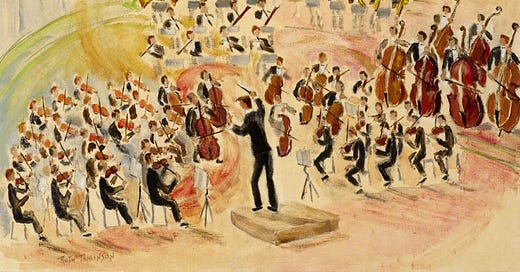Here is an anecdote — a thing that allegedly happened last week, which you may have heard about. But rather than opening with editorialization, I’d rather begin with the description provided by the Los Angeles Times:
“Multiple people who attended the Los Angeles Philharmonic concert on Friday reported hearing a woman making a moaning noise during the symphony’s second movement [of Tchaikovsky’s 5th symphony]. One attendee, composer and music producer Magnus Fiennes, described the sound on Twitter as that of a person having a ‘loud and full body orgasm’.”
Now, before getting into it, before you know any other details — I’d ask you to form an opinion on this. Because your initial reaction to this specific situation speaks meaningless multitudes about your general attitudes toward the world. Is your first reaction come on, it wasn’t really an orgasm. Or did you think oh, she was faking it. Or did you think there must have been other stimulants — wandering fingers or a pocket vibrator. Nobody climaxes to classical music.
Maybe you didn’t think any of those things. My first reaction was closer to well damn, now I really have to go see the LA Philharmonic; they must be incredible.
But then I thought about it for a bit longer and I came up with an alternative hypothesis — maybe, this sound (audio of the alleged orgasm in question was recorded and posted on Twitter) was the work of a confederate — an enterprising marketing executive with an eye for a viral moment. Consider this: you’re an enterprising marketing executive and you’ve been tasked with putting asses in seats for the LA philharmonic’s latest show. They’re playing Tchaikovsky’s 5th. Nobody really loves Tchaikovsky’s 5th. People love Tchaikovsky’s 1812 Overture or Swan Lake or maybe his violin concerto but not his 5th.1
So what do you, an enterprising marketing executive do? You go to the symphony and, just at the quiet moment, as the horns are lowering their moan, you fake a riotous orgasm. The headlines follow, as you knew they would. It’s called gorilla marketing and it always puts asses in seats.
But whatever your first reaction, whatever your eventual hypothesis, you very quickly move on with your life. Within minutes, the only way you think about Orgasm at the Symphony is something like good for them, whoever they are.
Of course, because this is 2023 and we can’t ever have nice things, the Orgasm at the Symphony quickly lost its shine as attendees offered dissenting anecdotes. Some eyewitnesses speculated that it was a medical condition or that the woman had fallen asleep and, jolted awake, she was startled to find herself in a packed theater with a full-blown symphony underway. And, I guess, maybe she yelped?
I don’t know and, again, it really doesn’t matter. But as wild, as unbelievable as this sounds, there is some relative scientific basis for the art orgasm and it’s something I’ve been curious about for a while. It’s called Stendhal Syndrome and, because it’s more of a pop psychology thing, it’s rarely studied seriously in the medical community. But in a 2018 study, a group of Columbian neuroscientists described it like this:
A very rare condition, known as aesthetic syndrome and, more commonly, Stendhal syndrome, entails a clinical phenomenon in which the presence of a beautiful piece of work or architecture causes dysautonomic symptoms such as tachycardia, diaphoresis, chest pains and loss of consciousness.
Stendhal syndrome — named after the French novelist — occasionally strikes some unfortunate (or, maybe, fortunate) tourist. Anytime somebody falls out while contemplating a painting at the Louvre or the Vatican, a few headlines ensue labeling it as an attack of Stendhal Syndrome.2
This syndrome pops up in the news every dozen-or-so years. There was the Bavarian named Franz who collapsed on the floor of the Uffizi Gallery in Florence while he was viewing Caravaggio’s Bacchus. According to the New York Times, Franz later said that “he had experienced uncontrollable sexual excitement.” Or the instance in 2018 when a man — also at the Uffizi Gallery — suffered a heart attack while admiring Botticelli’s Birth of Venus.
But for some reason, I haven’t seen a single article referring to the anonymous Tchaikovsky orgasmist as a case of Stendhal Syndrome. But why is that? I hate to point it out but maybe, just maybe, has nobody labeled this as superior appreciation of art solely because the case in question is a woman?
Anyway — let’s get your take. Here’s an anonymous poll:
and share :
A few things here. Firstly, I thought we weren’t playing Tchaikovsky because the Russians are currently the villains of our planet. Secondly, did you know that before John Steinbeck wrote a novel, sometimes, he’d psych himself up by listening to Swan Lake?
There are a number of these syndromes: Stockholm Syndrome, Jerusalem Syndrome, Paris Syndrome — all of them are fascinating internet holes for any self-respecting insomniac to wander down.




